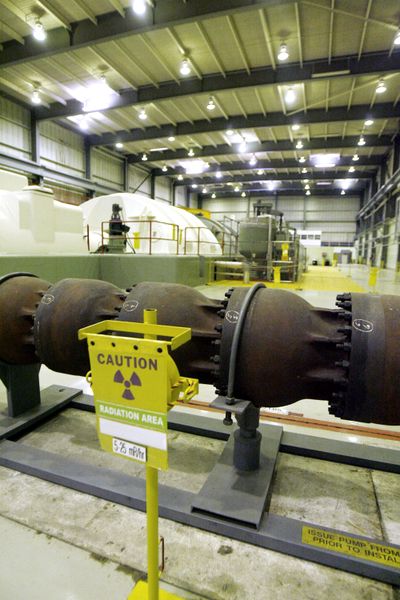Nuke plant leaks raise fears anew
Cancer-causing tritium found at 27 or more facilities in U.S.

MONTPELIER, Vt. – Radioactive tritium, a carcinogen discovered in potentially dangerous levels in groundwater at the Vermont Yankee nuclear plant, has now tainted at least 27 of the nation’s 104 nuclear reactors – raising concerns about how it is escaping from the aging nuclear plants.
The leaks – many from deteriorating underground pipes – come as the nuclear industry is seeking and obtaining federal license renewals, casting itself as a clean-green alternative to power plants that burn fossil fuels.
Tritium, found in nature in tiny amounts and a product of nuclear fission, has been linked to cancer if ingested, inhaled or absorbed through the skin in large amounts.
The Nuclear Regulatory Commission said Monday that new tests at a monitoring well on Vermont Yankee’s site in Vernon registered 70,500 picocuries per liter, more than three times the federal safety standard of 20,000 picocuries per liter.
Officials of the New Orleans-based Entergy Corp., which owns the plant in Vernon in Vermont’s southeast corner, have admitted misleading state regulators and lawmakers by saying the plant did not have the kind of underground pipes that could leak tritium into groundwater.
“What has happened at Vermont Yankee is a breach of trust that cannot be tolerated,” said Virginia Gov. Jim Douglas, who until now has been a strong supporter of the state’s lone nuclear plant.
The 104 nuclear reactors operating in 31 states provide only 20 percent of the nation’s electricity. But they are responsible for 70 percent of the power from non-greenhouse gas producing sources, including wind, solar and hydroelectric dams.
Vermont Yankee is just the latest of dozens of U.S. nuclear plants, many built in the 1960s and ’70s, to be found with leaking tritium.
NRC spokesman Neil Sheehan says leaks have occurred at 27 or more of the nation’s 104 commercial reactors at 65 plant sites. He said the list likely does not include every plant where tritium has leaked.
The leaks have several causes; underground pipes corroding and the leaking of spent fuel storage pools are the most common. The source of the leak or leaks at Vermont Yankee has not been found.
Many radiological health scientists agree with the Environmental Protection Agency that tritium, like other radioactive isotopes, can cause cancer.
There’s disagreement on the severity of the risk.
“Somebody would have to be drinking a lot of water and it would have to be really concentrated in there for it to do any harm at all,” said Jacqueline Williams, a radiation biologist at the University of Rochester Medical Center in New York state.
But in 2005, the National Academy of Sciences concluded after an exhaustive study that even the tiniest amount of ionizing radiation increases the risk of cancer.
“The scientific research base shows that there is no threshold of exposure below which low levels of ionizing radiation can be demonstrated to be harmless or beneficial,” Richard R. Monson, associate dean for professional education and professor of epidemiology at the Harvard School of Public Health, said when the NAS released its study.